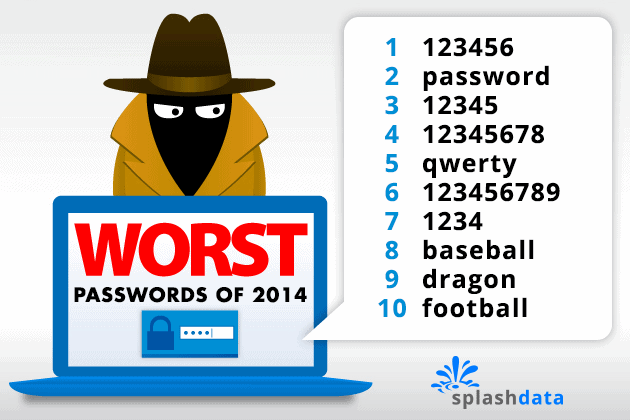Passwords . They can be the bane of your life sometimes. It seems as if you need a password for everything, whether it’s to protect your bank accounts, email accounts, accessing WiFi or even just trying to get into your desktop PC. And with so many passwords to remember, sometimes it’s understandable that people often make terrible choices when choosing which password to use. How terrible I hear you ask? Have a look at the 10 Worst Passwords of 2014 that SplashData have compiled on show above.
The winner for ‘Worst Password of 2014’ is ‘123456’ for the second year in a row. Amazing right? Possibly the only thing worse than this list of terrible passwords is the knowledge that many of the people using them have probably written them down somewhere and hidden in their desk drawer or on a post-it under the keyboard or even on the inside of their phone case.
The next fifteen candidates are hardly any better, as you can see below.
11. 1234567
12. monkey
13. letmein
14. abc123
15. 111111
16. mustang
17. access
18. shadow
19. master
20. michael
21. superman
22. 696969
23. 123123
24. batman
25. trustno1
It should go without saying that if you (or someone you know) use a password that either appears on this list or is similar to one on it, you should change it ASAP. If you use the same password for more than one website or application, stop that immediately and make separate passwords. Remember that your passwords should never just be numbers or letters, and also that you can use lower- and upper-case letters to form your new security-conscious password. Passwords should be at least 8 characters long, and no, 12345678 is still not acceptable. The longer and more varied the password, with the use of special characters, the harder it is to hack or to guess. Using your pet’s name as your password is no longer acceptable.
SplashData released this list of risky passwords in an effort to encourage or speed up the usage of stronger passwords. SplashData’s CEO, Morgan Slain states that ” Passwords based on simple patterns on your keyboard remain popular despite how weak they are,” and that “As always, we hope that with more publicity about how risky it is to use weak passwords, more people will start taking simple steps to protect themselves by using stronger password and using different passwords for different websites.
One way to keep on top of your passwords is to use a password manager which can organize and generate random passwords, as well as log into websites automatically. Co-incidentally, this is something that SplashData are also in the business of providing. There are a few other companies such as 1Password and LastPass that also offer a similar service. If you go down this route, why not read some user reviews of the services to make sure it suits your purposes. Once you have changed all the offending passwords, how to remember them? I know some people have little black books with all their passwords on it, others use a piece of paper that is stored in a laptop case. Others still believe that keeping the passwords stored with something like Google Keep is a secure method. Sadly, all the above methods are insecure. The black book might be stolen, the piece of paper thrown away, you may lend your phone to someone who will peek at your Google Keep notes, anything could happen. So again, as to how you remember these new-fangled secure passwords, well, hey, it’s probably best you don’t ask me. I’m lucky enough to be able to remember my passwords, pin numbers and even my bank card numbers off the top of my head. What are the worst passwords you’ve come across? And what are the worst methods of remembering passwords that you’ve seen? Let us know in the comments below or at our Google Plus page.
